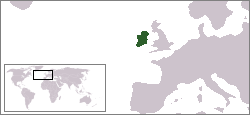Irish Republic facts for kids
Quick facts for kids
Irish Republic
Poblacht na hÉireann
(Saorstát Éireann) |
|||||||||||
|---|---|---|---|---|---|---|---|---|---|---|---|
| 1919–1922 | |||||||||||

The Island of Ireland
|
|||||||||||
| Capital | Dublin | ||||||||||
| Common languages | Irish, English | ||||||||||
| Government | Republic | ||||||||||
| President of Dáil Éireann | |||||||||||
|
• 1919
|
Cathal Brugha | ||||||||||
|
• 1919-1922
|
Éamon de Valera | ||||||||||
|
• 1922
|
Arthur Griffith | ||||||||||
| Legislature | Dáil Éireann | ||||||||||
| History | |||||||||||
| 24 April 1916 | |||||||||||
|
• Dáil Constitution
|
January 21 1919 | ||||||||||
|
• Free state constitution
|
December 6 1922 | ||||||||||
| Area | |||||||||||
| 1921 | 84,116 km2 (32,477 sq mi) | ||||||||||
| Population | |||||||||||
|
• 1921
|
4400000 | ||||||||||
| ISO 3166 code | IE | ||||||||||
|
|||||||||||
The Irish Republic was a country that declared itself independent from the United Kingdom. This happened during the Easter Rising in 1916. It was officially set up in 1919 by the First Dáil, which was Ireland's first parliament.
The Irish Republic only existed for a short time, from 1919 to 1922. This was during the Irish War of Independence. In this war, the Irish Republican Army fought against the forces of the United Kingdom.
The Republic officially ended in 1922. This happened when the Anglo-Irish Treaty was agreed upon. This treaty ended the war. After the treaty, 26 of Ireland's 32 counties became the Irish Free State. The other six counties stayed part of the United Kingdom and are now called Northern Ireland.
Some people, especially from the political party Sinn Féin, did not accept the treaty. They believed the Irish Republic still existed, even if it didn't control any land. Because of this, elected Sinn Féin members (called TDs) never took their seats in the parliaments of the Irish Free State or the United Kingdom.
Contents
What Was It Called?
In English, this revolutionary country was known as the 'Irish Republic'. In the Irish language, two different names were used:
- Poblacht na hÉireann
- The word 'poblacht' was new. It was created by the people who wrote the Proclamation of the Irish Republic in 1916.
- Saorstát Éireann
- Saorstát comes from two Irish words: saor (meaning "free") and stát (meaning "state"). So, it literally means "free state."
- The Irish Declaration of Independence and other important papers from 1919 used Saorstát Éireann.
It's interesting to know that Saorstát Éireann was also the official Irish name for the Irish Free State later on.
How the Irish Republic Was Governed
The Irish Republic had its own government structure.
The Parliament: Dáil Éireann
The parliament of the Irish Republic was called Dáil Éireann. It was made up of most of the Irish politicians who were elected in the 1918 general election.
Later, two more elections were held by the British government. But Irish nationalists saw these as elections for the Dáil. The members of the Second Dáil were elected in 1921. The Third Dáil was elected in 1922.
At its very first meeting, the Dáil created its own set of rules, called the Dáil Constitution. It also passed a Declaration of Independence.
The Ministers: Aireacht
The Dáil Constitution set up a group of ministers, like a cabinet. This group was called the "Aireacht" or "Ministry." The leader of the Aireacht was first known as the "Príomh Aire." This leader then chose the other ministers.
When the constitution was first made in January 1919, there were four main ministers:
- Minister of Finance (who handled money)
- Minister of Home Affairs (who managed things inside the country)
- Minister of Foreign Affairs (who dealt with other countries)
- Minister of Defence (who was in charge of the army)
In April 1919, the number of ministers grew to as many as nine. In August 1921, there was another change, and the role of president was created. At that time, there were six main ministers, each called a Secretary of State for different areas like Foreign Affairs, Home Affairs, and Finance.
Some important people, like Constance Markiewicz, became under-secretaries. Countess Markiewicz was the first woman ever elected to the British House of Commons. However, she chose not to take her seat there. Instead, she became a member of the first Dáil.
The Aireacht met whenever it was safe and secret enough to do so.
The Anglo-Irish Treaty
The Anglo-Irish Treaty was signed on December 6, 1921. This treaty was very important because it officially ended the War of Independence.
For the treaty to become official, it had to be approved three times:
- By the United Kingdom, as an agreement between their government and their subjects in Ireland.
- By the House of Commons of Southern Ireland. This parliament represented the people in Ireland under British rule.
- By Dáil Éireann. Supporters of the Irish Republic believed it was an independent country, so its parliament had to approve the treaty.
Interestingly, the people who made up the House of Commons of Southern Ireland were mostly the same people as those in Dáil Éireann. There were only four pro-British members in the House of Commons who were not part of the Dáil.
Related pages
Images for kids
See also
 In Spanish: República Irlandesa para niños
In Spanish: República Irlandesa para niños




